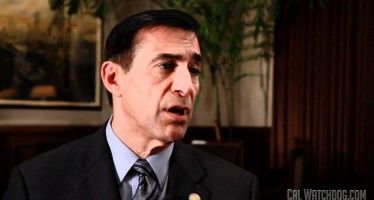Is Prop 33 consumer friendly or not?
By Katy Grimes
Should your good driver discount follow you when you change insurance companies? Proposition 33 will allow insurance companies to offer discounts to new customers who can prove they were continuously covered by any licensed auto insurance company over the previous five years. Known as “persistency discounts” and “loyalty discounts,” under current California law, insurance companies can only offer them to existing customers.
Opponents of Prop. 33 say it would raise drivers’ costs by as much as 40 percent.
Currently, when a good driver switches insurance providers, the continuous coverage discount does not follow. This was dictated by Proposition 103, written by Harvey Rosenfeld and passed by voters in 1988, which, according to Balletpedia.org, specifically prohibits insurers “from using the the absence of a prior policy as a factor in rate-setting.”
Prop. 33 would allow for the “transference” of loyalty discounts when customers switch insurance providers, bringing the absence/continuous presence of a policy into direct play as a factor in rate-setting.
Drivers who do not have auto insurance or who have had a lapse in coverage would not be eligible for the loyalty discount, but there are a few exceptions:
* If the lapse was 90 days or less over the past five years;
* If the lapse was no more than 18 months in the past five years because of unemployment due to layoff or furlough;
* If the lapse was due to active military service.
Prop 33 will not help most people who have had a long break in auto insurance coverage.
Follow the money
George Joseph, the chairman of large insurer Mercury General, is the largest donor to the “yes” on Prop 33 campaign. Joseph and Mercury were behind Proposition 17 in 2010, a similar ballot measure.
Currently, Joseph has given more than $8 million of his own money to the campaign. Along with Joseph, the Del Sol Group, Inc. has given $15,000; Abernathy Insurance Agency has donated $14,000; Calgard Associates has donated $10,000; and Rancho Simi Insurance Agency has donated $10,000.
The “no” on Prop. 33 campaign is being led by Consumer Watchdog, a nonprofit organization founded in 1985.
Founded by Rosenfeld in 1985, Consumer Watchdog has had its own public problems, staunchly refusing to reveal who its funders are. According to Democratic political consultant Steve Maviglio, Consumer Watchdog has been raking in millions of dollars for itself from a “self-serving intervenor fee provision it inserted into a ballot initiative.” Rosenfield wrote the ballot measure from which Maviglio claims he benefits.
Consumer Watchdog was recently exposed as collecting more than $5.6 million in fees from an intervenor program in the California Department of Insurance. “Under Commissioner Dave Jones, who has hitched his political wagon to the group, Consumer Watchdog has been the only group in the state to receive intervenor fees,” Maviglio wrote.
Contributions to the “no” on Prop. 33 campaign are substantial as well: Consumer Watchdog has donated $40,616, the Campaign for Consumer Rights donated $30,000, Consumer Federation of California donated $17,430, and Los Angeles philanthropist Chic Wolk donated $5,000.
‘Yes’ on Prop 33 campaign states:
“California law requires all drivers to buy automobile insurance. Approximately 85 percent of California drivers follow the law and buy insurance. If you follow the law and maintain continuous automobile insurance coverage, you are currently eligible for a discount, but only if you stay with the same insurance company. Current law punishes you for seeking better insurance or trying to get a better deal by taking away your discount for being continuously insured. Prop 33 would correct this to allow drivers to shop for competitive insurance pricing, without losing the good driver discount.
Other points:
* Prop. 33 encourages uninsured drivers to obtain insurance, because it makes it easier for them to earn the continuous coverage discount. This makes our roads safer.
* Prop. 33 will result in more competition between insurance companies, resulting in better insurance rates.
* If you are laid off or furloughed, Prop. 33 allows you to keep your status as a continuously covered driver for up to 18 months.
‘No’ on Prop. 33 campaign states:
* Prop. 33. deregulates the insurance industry, making big insurance companies less accountable.
* Prop. 33 unfairly punishes anyone who stopped driving for a good reason but now needs insurance to get back behind the wheel.
* Prop. 33 raises insurance rates for students completing college who now need to drive to a new job.
* It leads to higher premiums and hurts California’s middle-class families.
* It leads to more uninsured motorists because the financial surcharge applied to those who don’t qualify for the discount discourages people from buying insurance.
Related Articles
Congressman Darrell Issa faces tough political fight for re-election
Is Congressman Darrell Issa really in reelection trouble? Not that long ago, the Vista Republican was on top of the
Fleeting hope for fiscal reform
Feb. 28, 2010 Anyone who thinks that gubernatorial candidate Meg Whitman offers much hope for fixing the state’s structural fiscal
Why Our State Voted Way It Did
Anthony Pignataro: Wanna understand the 2010 midterm elections? Washington, DC-based Project Vote released a new report today to help explain




